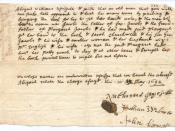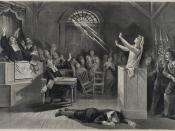Upon discussing his allegorical novel, Lord of the Flies, William Golding declares, "The theme of the book [Lord of The Flies] is an attempt to trace the defects of society back to the defects of human nature." Golding proves his theme throughout the book, in some places more than other. With the constant clues and tiny bits of information Golding provides, the alert reader can put two and two together, and realize that Golding's theme is indeed proven, and very clearly so.
Golding allows for his theme to prevail in one scene, towards the end of the book, when Jack establishes his power as ruler and everyone else's inferiority to him. 'Jack rose from the log that was his throne, and sauntered to the edge of the grass.' The fact that Jack has a throne and the authority to saunter as if he was true royalty is established. Throughout history, monarchies and tyrannies have proved to be inefficient, and unhelpful to the good of the country in question.
But monarchies still existed, and still do exist. The monarchs are not stupid- they know that they are not best for their countries. But it is that lust for power, that want to be superior to others that drives kings, queens, tyrants, and the Jack Merridews all over the world to not resign, and allow for a more efficient system of government to be established. Shortly after this passage, Jack orders the capture of Sam and Eric, the murder of Piggy, and the murder of Ralph (although the naval officer arrives to save Ralph). Such things occur when there is one all-powerful ruler, and we have seen examples of that throughout history. Consider the King of England, in colonial times. He taxed the colonies, he killed the natives, he imprisoned those...


